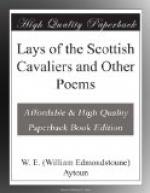Three years after the accession of James VII. Claverhouse was raised to the peerage, by the title of Lord Viscount Dundee. He was major-general, and second in command of the royal forces, when the Prince of Orange landed, and earnestly entreated King James to be allowed to march against him, offering to stake his head on the successful result of the enterprize. There is little doubt, from the great popularity of Lord Dundee with the army, that, had such consent been given, William would have found more than a match in his old officer; but the King seemed absolutely infatuated, and refused to allow a drop of blood to be shed in his quarrel, though the great bulk of the population of England were clearly and enthusiastically in his favour. One of the most gifted of our modern poets, the Honourable George Sydney Smythe, has beautifully illustrated this event.
“Then out spake gallant Claverhouse,
and his soul thrilled wild and high,
And he showed the King his subjects, and
he prayed him not to fly.
O never yet was captain so dauntless as
Dundee!
He has sworn to chase the Hollander back
to his Zuyder-Zee.”
But though James quitted his kingdom, the stern loyalty of Dundee was nothing moved. Alone, and without escort, he traversed England, and presented himself at the Convention of Estates, then assembled at Edinburgh for the purpose of receiving the message from the Prince of Orange. The meeting was a very strange one. Many of the nobility and former members of the Scottish Parliament absolutely declined attending it, some on the ground that it was not a legal assembly, having been summoned by the Prince of Orange, and others because, in such a total disruption of order, they judged it safest to abstain from taking any prominent part. This gave an immense ascendency to the Revolution party, who further proceeded to strengthen their position by inviting to Edinburgh large bodies of the armed population of the west. After defending for several days the cause of his master with as much eloquence as vigour, Dundee, finding that the majority of the Convention were resolved to offer the crown of Scotland to the Prince, and having moreover received sure information that some of the wild fanatic Whigs, with Daniel Ker of Kersland at their head, had formed a plot for his assassination, quitted Edinburgh with about fifty horsemen, and, after a short interview—celebrated by Sir Walter Scott in one of his grandest ballads—with the Duke of Gordon at the Castle Rock, directed his steps towards the north. After a short stay at his house of Duddope, during which he received, by order of the Council, who were thoroughly alarmed at his absence, a summons through a Lyon herald to return to Edinburgh under pain of high treason, he passed into the Gordon country, where he was joined by the Earl of Dunfermline with a small party of about sixty horse. His retreat was timeous, for General Mackay, who commanded for the Prince of Orange, had




